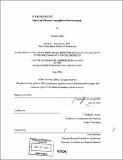E M B O D I M E N T : mental and physical geographies of the neo-nomad
Author(s)
Abbas, Yasmine
DownloadFull printable version (3.440Mb)
Alternative title
Embodiment : mental and physical geographies of the neo-nomad
Mental and physical geographies of the neo-nomad
Other Contributors
Massachusetts Institute of Technology. Dept. of Architecture.
Advisor
William L. Porter.
Terms of use
Metadata
Show full item recordAbstract
Globalization is today significantly debated. The ineluctable phenomenon has led to homogenization, hybridization, cultural confusion, and social disorders. The resulting chaos has been translated by a loss of landmarks, which has consequently engendered mental and physical displacements. New species, hybrids, have emerged from these various cultural encounters. Displaced, these populations of the border, the 'third' space, have developed their adaptation skills, including choice and negotiation, in order to assert a sense of belonging. Among the plethora of today's nomads such as refugees, global workers, and immigrants for example, hybrids are species that have mutated. They have become something detached from established orders, and not attached to any specific place. Like nomads, they move and adapt. Neo-nomads, then, in their effort to adapt and build a sense of belonging not bound to place, reminds us of the traditional nomads. By analyzing the hybrid, the ensuing spatiality, skins, and geographies of the neo-nomad, this thesis offers an open-ended discussion about mobility, connectivity and space. These observations lead to the conclusion that nomads we were, nomads we are, and nomads we will be, always.
Description
Thesis (S.M.)--Massachusetts Institute of Technology, Dept. of Architecture, 2001. Includes bibliographical references (leaves 57-58).
Date issued
2001Department
Massachusetts Institute of Technology. Department of ArchitecturePublisher
Massachusetts Institute of Technology
Keywords
Architecture.